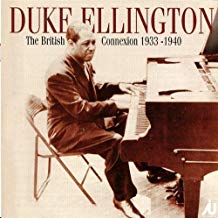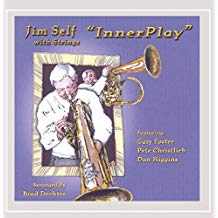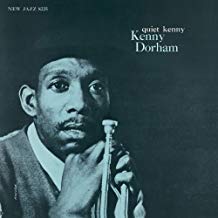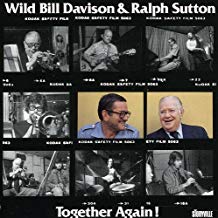-
Posts
13,205 -
Joined
-
Last visited
-
Donations
0.00 USD
Content Type
Profiles
Forums
Events
Blogs
Everything posted by Larry Kart
-
Think I remember that story; my lips are sealed.
-
Based on information from elsewhere, here's the story. The solo is Ben's, improvised and created under circumstances that Ted has explained above, though Duke later probably asked Ben to codify the solo to some degree, and why not? Ben also wrote the piece's sax-section passage. What Duke did write is Ben's solo on "The Blues" section of "Black, Brown, and Beige." It was that piece of retained information that confused me.
-
I recall reading somewhere (wish I could be specific) the claim that Ben Webster's recorded solo on "Cottontail" was not improvised by Webster but written out for him by Ellington, Until I read that, it had never occurred to me that this might be the case. Yesterday, I bought this album (below), which is full of delights and includes a June 12, 1940 "America Dances" aircheck of "Cottontail" on which, aside from a few familiar figures toward the end, Webster's solo is not all the same as his solo on the band's recording. Any thoughts?
-
Jim Self, the Hollywood studio and classical tuba stalwart who, among other things, gave us the tones for the mothership in "Close Encounters of the Third Kind," has made several nice jazz albums -- his model as an improviser being Art Farmer. Also, one of Self's classical albums has his setting for tuba of Debussy's "Syrinx" -- as he says in the notes, "it's 44 semi-tones below the notated pitch." The results are quite beautiful, though what a snake that would have been. This one is quite good:
-
First time I heard a big band live was Basie on this very tour. "All that air moving around you" is a fine way to put it. IIRC, the first tune they played at that concert was the semi-flagwaver "Stereophonic," and after the trumpets cut in I pretty much had to pick myself up from the floor. Think I was sitting just a few rows from the stage, too. And that sax section!
-
Glad to hear that story. I remember when the Fairmont tried to book entertainment, but I was no longer writing about jazz for the Tribune in the nineties and thus missed that gig. That was a swinging band. Quite a solo from Benny Green.
-
I'm a fan of all three singers, and/but they're quite different from each other. For me, on these tracks Forrest brings her own fine, urgent, and as Jim says floating time feel to the proceedings. Is it finger-popping swing? Not here, but it shouldn't be, given the material and the moods. Is it it powerfully, meaningfully rhythmic? For me, yes. A different backing? It would have to be just right, and not every overtly swinging small group or big band of that time would have been. This way, the accompanying forces' rhythmic feel, such as it is, leaves Forrest's own rhythmic feel, not mention her considerable sexiness, to be felt quite clearly.
-
Don't know.
-

Nice experience with the Jamal Mosaic set
Larry Kart replied to Larry Kart's topic in Miscellaneous Music
Oops, I misspelled "Vernel." -
I had some pleasant encounters with both of them through the years (I was a great admirer of their work, of Jackie especially), but after Roy passed I found out from a longtime close friend and sometime musical associate of Jackie's that Roy was a control freak in the top class who abused Jackie emotionally on a consistent basis. One of the big problems that Jackie had after Roy passed is that she pretty much didn't know how to do anything in terms of practical living -- finances in particular. Roy had swept all that over to his side of the table and kept Jackie in the dark. Fortunately, she had a male friend of her age who had been fond of her for years, and he tried his best to help her out/help her along. Lord knows she could sing like an angel almost until the end. BTW, she couldn't read music; everything she sang she learned by ear.
-
Was listening to it in the basement yesterday, and when I came upstairs my wife -- who is a talented classical pianist and very good interpreter/spontaneous re-harmonizer of show tunes, though far from steeped in jazz -- said, "Who IS that drummer?" Pretty hip of her to pick up on Vernell Fournier, and from the basement yet.
-

Which Mosaic Are You Enjoying Right Now?
Larry Kart replied to Soulstation1's topic in Mosaic and other box sets...
Indeed. I assume the altoist is Ernie Watts, but who is the trombonist? -
OK -- now some tracks from the Forrest album (her subtle reshaping of "Embraceable You" is really special): https://www.youtube.com/watch?v=gkt4NQ1AAoQ https://www.youtube.com/watch?v=0fqPYRikSgc https://www.youtube.com/watch?v=hbMCpjtPWw8 https://www.youtube.com/watch?v=R77jEHNP4RU https://www.youtube.com/watch?v=apeJs4KiJ58
-

Hank Mobley by Larry Kart
Larry Kart replied to Brad's topic in Jazz In Print - Periodicals, Books, Newspapers, etc...
Just ordered James' "Ten Modern Jazzmen." RE: cause and time of James' demise, my only source says he doesn't know for sure but thinks it was in middle age and from an illness. -
Yes -- string orchestra led by Carmen Dragon; leader on the big band tracks not identified, may also be Dragon. Brief trumpet solos by, annotator Scott Yanow speculates, Manny Klein or Andy Secrest. Dragon's name may make the blood run cold, but so far the tracks with strings aren't particularly soupy or swirly; nothing can mess with Forrest anyway; she's in charge.
-

Hank Mobley by Larry Kart
Larry Kart replied to Brad's topic in Jazz In Print - Periodicals, Books, Newspapers, etc...
James didn't quite "co-author" this book; assembled/edited by Max Harrison, it's a compilation of uniformly worthwhile and at best superb essayistic record reviews (many of them, I think, originally written for Jazz Monthly) by the writers listed on the cover. An altogether terrific book. Also known as "Modern Jazz: The Essential Records." My first copy literally fell apart after the cover fell off; fortunately I found another copy. -

Hank Mobley by Larry Kart
Larry Kart replied to Brad's topic in Jazz In Print - Periodicals, Books, Newspapers, etc...
Don't know precisely what happened to James (i.e. why) except that, per his younger Jazz Monthly colleague of the time Terry Martin, James died in early middle age. I'll try to find out more, but I recall that it was matter of illness, not of any sort of dissipation. I know that James was active as late as 1968 because in that year he wrote a somewhat negative review of Lester Bowie's "Numbers 1&2" for Jazz Monthly. Haven't seen that whole review, but George Lewis' exceprts from it "A Power Stronger Than Itself" make clear how puzzling that music could be to a listener whom one might think would be well-equipped to respond to it. -
The price on Amazon is prohibitive, $71, but if you have any fondness for (arguably) the best band singer of the '30s and '40s and ever see this two-CD set of Forrest transcriptions from 1949-50 at a reasonable price ( (I got it a re-sale shop today for 27 cents!) don't hesitate. Forrest is in superb form, the program is all standards (54 tracks, most of them about 2 minutes, but that's fine; they're all Forrest, hardly any instrumental work), and sound quality on Forrest is quite good. If you don't know her, one way to describe Forrest is that if Judy Garland were a jazz singer, she might have sounded something like this. There's a throb in both their voices, a more or less erotic throb in Forrest's, while what makes Forrest a jazz singer, a least by my lights, is that she subtly reshapes melodies like an improvising instrumentalist -- Benny Carter perhaps. https://www.amazon.com/Complete-World-Transcriptions-Forrest-1999-11-16/dp/B01K8MJT7Y/ref=sr_1_1?s=music&ie=UTF8&qid=1537636742&sr=1-1&keywords=helen+forrest+world+transcriptions
-

Hank Mobley by Larry Kart
Larry Kart replied to Brad's topic in Jazz In Print - Periodicals, Books, Newspapers, etc...
Another piece of mine on Mobley is coming on that site if it's not there already -- the liner notes for "Poppin.'" I like that one better than the one that's posted now. It's looser, in a good way I think. P.S. Michael James was one heck off a noble pioneer when it came to taking hard-bop players seriously and writing about them in shrewd detail. Believe me, a lot of those players weren't getting much positive critical attention back then, or much critical attention at all. In some cases, their music wasn't even being understood, was felt to be some sort of ugly abberation. Witness, for one, Whitney Balliett's infamous and later on suppressed put down of Sonny Rollins in the liner notes to John Lewis' "Two Degrees East, Three Degrees West." In the course of praising the certainly praiseworthy Bill Perkins for his gentle lyricism, Balliett went on to say this: "There is [in Perkins' playing] none of the hair-pulling, the bad tone, or the ugliness that is now a growing mode, largely in New York, among the work of the hard-bopsters like Sonny Rollins, Hank Mobley, and JR Monterose." Actually, I kind of like "the hair-pulling" -- in one way, it's completely out of left field; in another way, it reveals exactly where Whitney was coming from. Also, of course, his lumping Mobley together with Rollins and Monterose from the point of view of their supposed shared tonal-timbral characteristics etc. is evidence that he wasn't even paying much attention. For sure, Ira Gitler was giving the up-and-coming hard-bop stalwarts their due in real time but in a more fan-like, less analytical manner than was James' style. James passed away much too soon. -
I heard Kuhn in Chicago with the original Coltrane quartet (with Steve Davis and Pete LaRoca), and at that time he was about as avant-garde as Paul Bley was. Later on he pulled in his horns a fair bit, albeit in a natural (for him) evolutionary manner.
-
A gem. The four standards here -- "Alone Together," "My Ideal," "I Had the Craziest Dream," and "Old Folks" -- are superb. https://www.youtube.com/results?search_query=dorham+old+folks It's a paltry word for it, but the continuity!
-
Wild Bill Davison and Ralph Sutton in fine from. Of the rest of the band, all Danes, reedman Jesper Thilo stands out.
-
I always preferred Henderson when he got foxy and oblique, rather than hot. This is a good example. It's his solo on the final track, "Neither Here Nor There," of Mulgrew Miller's album "Hand in Hand," which begins at about 53.18. https://www.youtube.com/watch?v=GzRv6WM8PAU&start_radio=1&list=RDGzRv6WM8PAU Larry Kart
-

Serena Williams vs The World
Larry Kart replied to Soulstation1's topic in Miscellaneous - Non-Political
Of course it is, but that doesn't mean (see Kevin Drum's blog post above) that the original Serena-U.S. Open incident had a racist basis or a sexist one either.
_forumlogo.png.a607ef20a6e0c299ab2aa6443aa1f32e.png)





